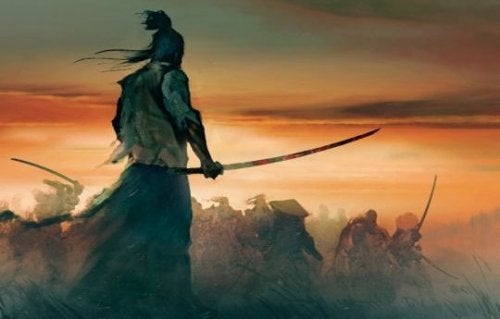Samurai phrases speak of one of the most important cultures and philosophies of all time. Moreover, what really did these special warriors were not their combat skills, but the principles and values that inspired them.
Some of the great fighters were also magnificent thinkers and writers, they were able to capture the most important aspects of the worldview that prevailed among them, this is how we now have access to samurai phrases that reveal their immense wisdom.
“I don’t know anything about how to beat others. Do I just know how to outdo myself?” -Bushido-
Three of the most famous warriors, who were also the creators of many samurai phrases, were Yamamoto Tsunetomo, Inazo Nitobe, and Miyamoto Musashi. Below we have compiled 10 of his most famous statements.
Many samurai phrases invite you to sharpen your senses and make the most of them. This, for example, says: “Observation and perception are two different things; is the eye that observes stronger, is the eye that perceives weaker?” By Miyamoto Musashi and contrasts the differential value between observing and seeing.
This other sentence emphasizes something the Orientals insist on a lot: don’t focus on yourself. He says, “Think a little about yourself and the depths of the world. “This means that we must not stick to these fantasies about ourselves and instead use that Energy to reflect on the reality in which we find ourselves.
The struggle is also present in many samurai phrases. He declares, “Today’s victory is over yesterday’s self, tomorrow’s victory over an inferior man. “This means that whenever we overcome a weakness or error in ourselves, we are also ready to overcome those who have that weakness or error.
Yamamoto Tsunetomo is another of the figures that left marked many samurai phrases. In the following statement, he talks about the importance of starting things with energy and strength so that vitality remains sufficient. He says, “If you throw without force, seven out of ten actions don’t come to an end. “
This other statement speaks of the importance of difficulties. He points out that it is them and the struggle to overcome them that build character. Yamamoto Tsunetomo said: “It is good to find difficulties in youth, because those who have never suffered have not built their character. “
More than an author, Inazo Nitobe is an excellent compiler of samurai prayers. Many of these teachings have an unknown origin, but they reflect an immense lucidity. This, for example, speaks of the relationship between courage and tranquility. She says: “The spiritual aspect of courage is highlighted by calm, the presence of a serene spirit. Is the courage of tranquility at rest?
This other text is about stoicism, about the ability to be strong in the face of pain. Be resilient and always considerate of others. He says: “The discipline of force, which, on the one hand, teaches resistance without complaining, and on the other. on the other hand, he teaches courtesy, demanding that we not spoil the pleasure or serenity of others by expressing our own sadness or pain. “
Another statement read: “Benevolence was considered a sovereign virtue in a two-way sense: sovereign among the multiple attributes of a noble and sovereign spirit because it is particularly suited to the role of a sovereign. “In it, the philosophy of the samurai is very well reflected, which has never separated the struggle from the power of good and spiritual values.
At work? The warrior’s way? Or?The way of the samurai there are many declarations that contain a lot of wisdom, all invite you to face life courageously and to keep personal evolution in mind, this always happens in us and then it is reflected outside It is a work that teaches the art of living well.
One of the phrases in this book says, “When you give advice, you must first discern whether the other person is willing to accept it or not. “It’s a valuable recommendation that reminds us that no one can be helped or guided if I don’t want to. Or as they say in a more modern way: don’t give advice to anyone who doesn’t ask for them.
Another sentence reads: “If you enter the unexplored path, endless secrets will appear in the end. “It’s a good way to invite people not to fear the new or the unknown. Every time we get into it, we end up learning valuable lessons.
Samurai are interpreted in film as incredibly skilled warriors, they were, but much more than that, their attitude to life was that of those who always wanted to be better and saw spirituality as a means to achieve that goal.

